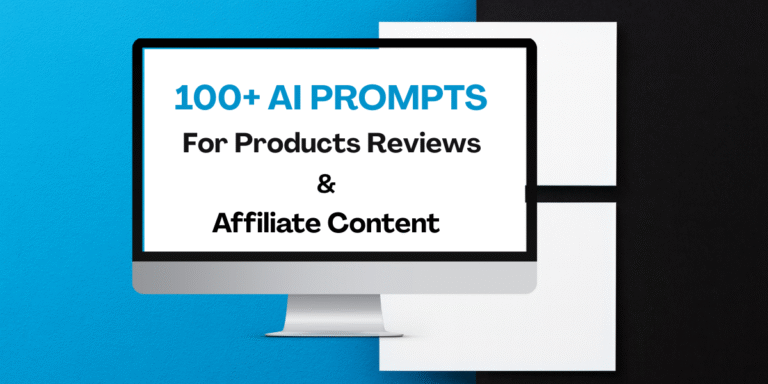Writers vs Prompt Engineers: Who Wins the Blogging Game?

The great divide in content creation: Are we witnessing the death of traditional writing or the birth of a new skill set?
Real writers vs prompt engineers blogging debates hit me like a slap in the face when I attended a content marketing conference back in 2023.
I was sitting in the hotel bar, nursing a whiskey and complaining about client deadlines, when this 22-year-old kid next to me started bragging about his “$150K annually from blogging.”
My first thought? Bullshit.
My second? Tell me more.
Turns out, this kid, let’s call him Sean, doesn’t “write” in the traditional sense.
He’s a prompt engineer who’s mastered the art of getting AI to produce content that ranks, converts, and scales. In the time it takes me to craft one carefully researched 2,000-word article, Sean pumps out fifteen optimized pieces across multiple niches.
“I don’t need to be a great writer,” he told me with the confidence only a Gen-Z entrepreneur can muster. “I just need to be great at telling AI what to write.”
That conversation kept me awake until 4 AM, not because I was angry, but because I realized we’re living through a fundamental shift in what it means to be a content creator.
The two Camps (And Why They Hate Each Other)

The blogging world has split into two distinct tribes, and the tension between them is real:
Team Traditional Writer
These are the people who bleed ink and consider themselves craftspeople.
They:
- Spend hours researching and fact-checking
- Develop unique voices and perspectives
- Create original insights based on personal experience
- View writing as an art form that requires human intuition
- Believe authenticity comes from human struggle and expertise
I used to be 100% in this camp. Hell, part of me still is.
Team Prompt Engineer
These are the efficiency-obsessed scalers who see content as a systems problem.
They:
- Focus on getting AI to produce exactly what they need
- Optimize for volume and algorithmic performance
- Treat content creation like manufacturing
- Believe human creativity is better spent on strategy than execution
- View traditional writing as an outdated bottleneck
The interesting thing? Both camps are making money. But they’re playing completely different games.

Skills Breakdown: What Each Camp Does

Let me break down what these two approaches actually look like in practice, because the differences are more nuanced than you might think.
Traditional Writing Skills
Research and Analysis: Spending 3-4 hours digging into topics, finding unique angles, and developing original insights.
Voice Development: Years of practice creating a distinctive writing style that readers recognize and trust.
Experience Integration: Weaving personal stories, failures, and lessons learned into content that feels authentic.
Editorial Judgment: Knowing what information to include, what to cut, and how to structure for maximum impact.
Subject Matter Expertise: Developing deep knowledge in specific niches through actual experience, not just research.
Prompt Engineering Skills
System Design: Creating prompts that consistently produce desired outputs across different AI models and tools.
Optimization Testing: A/B testing different prompt structures to maximize content quality and relevance.
Workflow Automation: Building repeatable processes that can scale content production without proportional time investment.
Multi-Model Fluency: Understanding the strengths and weaknesses of different AI tools (SEO Writing AI, Frase AI, Scalenut, Quillbot, ChatGPT, Claude, etc.).
Quality Control: Developing systems to review, edit, and improve AI output efficiently.

The Income Reality Check
Here’s where things get uncomfortable for those of us who’ve spent years honing traditional writing skills.
Traditional Writer Economics
My Personal Numbers (2023):
- Average time per 2,000-word article: 6-8 hours
- Research, writing, editing, optimization
- Typical client rate: $300-500 per article
- Monthly output (realistic): 15-20 articles
- Monthly income range: $3,500-$6,000
The Ceiling Problem: There are only so many hours in a day. Even at premium rates, traditional writers hit an income ceiling based on time investment.
Prompt Engineer Economics
Sean’s Numbers (According to Him):
- Average time per 2,000-word article: 45 minutes
- Prompt creation, AI generation, quick edit
- Typical output value: $150-300 per article
- Monthly output: 60-80 articles
- Monthly income range: $9,000-$24,000
The Scale Advantage: With blogging, you can make huge money compared to freelance writing when you can produce content at this volume.
Now, I’m not saying Sean’s numbers are typical; many prompt engineers struggle with quality control and client retention. But the potential for scaling is undeniable.
Quality Debate (And Why It’s Complicated)

The obvious question: Is prompt-engineered content actually good?
Where AI Content Wins
Consistency: AI doesn’t have bad days, writer’s block, or personal drama affecting its output.
Optimization: AI chatbots can assist you in your entire blog creation journey, from brainstorming ideas to drafting with perfect keyword integration.
Speed: The ability to test different angles, headlines, and approaches rapidly.
Data Processing: AI can synthesize information from multiple sources faster than any human.
Where Traditional Writing Wins
Original Insights: AI can’t share your personal experience of losing $10K on a failed product launch.
Authentic Voice: Readers can usually tell when content has been human-crafted versus AI-generated.
Emotional Connection: Stories, struggles, and personal revelations that build reader loyalty.
Expert Judgment: Knowing what advice actually works based on real-world experience.
Hybrid Approach (And Why It’s Winning)
Here’s what I’ve discovered after years of experimenting: the most successful content creators aren’t purely in either camp. They’re building hybrid skills.
My Current Workflow
Traditional Writing Elements:
- Original research and personal insights
- Authentic voice and storytelling
- Strategic content planning based on expertise
Prompt Engineering Elements:
- AI-assisted research and fact-checking
- Optimization suggestions and semantic keyword research
- First-draft generation for routine sections
This approach lets me maintain quality while increasing output from 15 articles monthly to about 25.
The Skills That Truly Matter in 2025 and Beyond
After talking to successful creators in both camps, here are the skills that seem to predict success:
1. Strategic Thinking: Whether you’re writing or prompting, you need to understand audience needs and content strategy.
2. Quality Control: The ability to recognize and fix bad content, regardless of how it was created.
3. Subject Matter Knowledge: AI can’t fake genuine expertise. The most successful prompt engineers are those who deeply understand their niches.
4. Adaptation: The job of a prompt engineer was one of the hottest in 2023, but has become obsolete due to models that better intuit user intent. Skills need to evolve constantly.

Tools That Are Changing Everything
The prompt engineering revolution isn’t just about ChatGPT. There’s an entire ecosystem of tools that’s changing how content gets created:
Content Generation Tools
ChatGPT Plus – Still the most versatile for general content creation
Claude Pro – Better for longer-form content and maintaining voice
Frase AI – Specialized for SEO optimized content with brand voice training
Optimization and Research
Surfer SEO – Content optimization that works for both human and AI content
Clearscope – Semantic keyword research that informs prompting strategies
MarketMuse – Content gap analysis and topic modeling
Workflow Automation
Make – Connecting AI tools with publishing platforms
Notion AI – Document management with AI assistance
Copy.ai – Bulk content generation with brand consistency
Note: These are only a few examples of what’s out there. The truth is, there’s a whole library of AI tools built for different needs, and it just keeps growing.
The Dark Side Nobody Talks About

Both camps have serious problems that industry cheerleaders won’t admit:
Traditional Writer Problems
The Burnout Factor: I’ve watched too many talented writers flame out because they can’t compete with AI-assisted volume.
The Relevance Crisis: Clients are increasingly questioning why they should pay premium rates for human writing when AI can produce “good enough” content.
The Scale Limitation: You simply cannot compete on volume with prompt engineers, which limits income potential.
Prompt Engineer Problems
The Quality Inconsistency: AI output varies wildly, and many prompt engineers lack the editorial skills to fix problems.
The Expertise Gap: Strong writing skills will be a requirement. After all, prompting is all about language. Many prompt engineers can generate content, but can’t evaluate its accuracy or usefulness.
The Commoditization Risk: As AI tools get better and more accessible, prompt engineering skills become less valuable.
Case Study: The $$$ Experiment
Three months ago, I decided to test both approaches by creating two separate content streams:
Stream A: Traditional Writing
- 20 carefully crafted articles in my established voice
- Extensive research and personal insights
- Average 8 hours per piece
- Total time investment: 160 hours
Results:
- Average monthly traffic: 8,500 visitors
- Email signups: 145 new subscribers
- Client inquiries: 8 high-quality leads
- Revenue generated: $12,400
Stream B: Prompt Engineering
- 60 AI-assisted articles with light editing
- Strategic prompt creation and optimization
- Average 90 minutes per piece
- Total time investment: 90 hours
Results:
- Average monthly traffic: 15,200 visitors
- Email signups: 89 new subscribers
- Client inquiries: 3 medium-quality leads
- Revenue generated: $6,800
The Surprising Conclusion
Volume won on traffic and overall visibility, but quality won on conversion and relationship building. The traditional writing approach generated 82% more revenue per hour invested, but the prompt engineering approach built a larger audience.
Future Predictions (Based on Current Trends)
Here’s where I think this is all heading:
Short-Term (2025-2026)
Tool Consolidation: Prompt engineering has rapidly evolved from a niche technique into a fundamental skill in the age of generative AI. Expect major platforms to integrate better AI assistance.
Skill Hybridization: The most successful creators will combine both skill sets rather than choosing sides.
Quality Backlash: As AI content floods search results, premium human-crafted content will become more valuable for building trust and authority.
Long-Term (2027-2030)
AI Gets Better: Prompt engineering becomes less technical as AI tools become more intuitive.
Human Expertise Premium: Original insights, personal experience, and genuine expertise become the main differentiators.
New Job Categories: We’ll see entirely new roles emerge that we can’t even imagine yet.
My Personal Evolution (And What I’m Doing Now)

A while ago, I was a prompt engineering skeptic. Today, I’m a cautious adopter who’s found a middle path. That’s why Blog Recode is all about blogging smarter with AI.
What I’ve Kept from Traditional Writing
- Thorough research and fact-checking
- Personal anecdotes and authentic voice
- Strategic content planning based on expertise
- Editorial judgment about what works for my audience
What I’ve Adopted from Prompt Engineering
- AI-assisted research and ideation
- Faster first-draft creation for routine content
- Better optimization through AI analysis
- Testing multiple angles before committing to one
My Current Hybrid Process
- Strategic Planning (Human): Decide what topics serve my audience and business goals
- Research (AI-Assisted): Use AI to gather information, then verify and add personal insights
- Outline Creation (Collaborative): AI suggests structure, I add personal stories and unique angles
- First Draft (Hybrid): AI handles routine sections, I write anything requiring expertise or authenticity
- Editing and Optimization (Human): Final voice, fact-checking, and quality control
This approach has increased my output by 60% while maintaining the quality that builds reader trust.
Skills You Absolutely Need to Survive
Regardless of which camp you lean toward, here are the skills that will matter in the next few years:
Core Competencies
Strategic Thinking: Understanding your audience, business goals, and content strategy
Quality Control: Recognizing good content regardless of how it was created
Adaptability: Learning new tools and techniques as they emerge
Subject Matter Expertise: Developing genuine knowledge in your chosen niches
Technical Skills
Basic Prompt Engineering: Even traditional writers need to understand how to get better output from AI tools
SEO Understanding: Content needs to be discoverable to be valuable
Analytics Interpretation: Measuring what actually works for your audience
Tool Proficiency: Staying current with the platforms and software that drive results
Human Skills
Authentic Voice: What makes your content distinctly yours
Relationship Building: Creating connections with readers and clients
Editorial Judgment: Knowing what’s worth publishing and what isn’t
Continuous Learning: Staying curious and adaptable as the landscape changes
Uncomfortable Truth About Both Camps
After spending time in both worlds, here’s what I’ve learned:
Great prompt, engineers still need writing skills. The best ones understand language, audience, and storytelling; they just use AI to scale their expertise.
Great writers need to embrace AI assistance. Those who refuse to adapt are limiting their potential impact and income.
Quality matters more than method. Readers don’t care how content was created; they care whether it helps them solve problems or achieve goals.
The future belongs to hybrids. The most successful content creators will combine human creativity with AI efficiency. So should you.
What I’m Telling Other Bloggers
When fellow bloggers ask me whether they should learn prompt engineering or double down on traditional writing skills, here’s what I tell them:
If You’re a Beginner
Learn both.
Start with basic writing skills to understand what good content looks like, then add AI tools to scale your efforts. Don’t try to become a pure prompt engineer without understanding the fundamentals of communication.
If You’re an Experienced Writer
Embrace AI as a tool, not a replacement.
Use it to handle routine tasks while focusing your human creativity on unique insights and authentic connections.
If You’re Struggling with Volume
Consider adding prompt engineering skills to your toolkit, but don’t abandon what makes your content uniquely valuable.
If You’re Scaling a Business
Build systems that combine both approaches. Use AI for efficiency and humans for quality control and strategic direction.
The Bottom Line
Writers vs prompt engineers blogging debates miss the point. This isn’t about choosing sides; it’s about adapting to a changing landscape while maintaining what makes content valuable.
The creators who win won’t be those who pick a camp and defend it religiously. They’ll be the ones who use every available tool to create content that genuinely helps their audience while building sustainable businesses.
I’ve stopped thinking of myself as either a “real writer” or a “prompt engineer.” I’m a content creator who happens to use both human creativity and AI assistance to serve my readers better. And that’s what Blog Recode is all about.
The question isn’t whether you’re Team Human or Team AI. The question is: Are you creating content that matters, and are you using the best available tools to do it efficiently?
That’s the real game. And honestly? There’s room for everyone to win it.
FAQs
Do I need to choose between traditional writing and prompt engineering?
No. The most successful content creators combine both skill sets. Use AI for efficiency and research while maintaining your unique voice and expertise.
The hybrid approach often produces the best results for both quality and scale.
Can prompt engineers really make more money than traditional writers?
It depends on execution. Prompt engineers can potentially scale higher due to volume, but traditional writers often command premium rates for specialized expertise.
The highest earners typically combine both approaches strategically.
Is prompt engineering a legitimate skill or just a trend?
While the specific role of “prompt engineer” may evolve as AI becomes more intuitive, the underlying skills, understanding AI capabilities, optimizing human-AI collaboration, and scaling content production, will remain valuable for content creators.
How long does it take to learn effective prompt engineering?
Basic prompt engineering can be learned in weeks, but mastering it for professional content creation takes 3-6 months of consistent practice.
The learning curve is shorter than traditional writing but requires understanding both AI capabilities and content strategy.
Will AI eventually replace human writers entirely?
Unlikely. AI struggles with original insights, personal experience, and authentic voice, elements that build reader trust and loyalty.
The trend is toward AI-human collaboration rather than replacement, with humans focusing on strategy and AI handling execution.
What tools do I need to start with prompt engineering?
Start with Frase AI, SEO Writing AI, ChatGPT Plus, or Claude Pro for content generation, add Surfer SEO for optimization, and use basic prompt frameworks.
You don’t need expensive tools initially—focus on learning effective prompting techniques first.
How do readers respond to AI-assisted content?
Reader response depends on quality and disclosure.
Well-crafted AI-assisted content that provides value often performs well, but purely AI-generated content without human insight typically struggles with engagement and trust-building over time.
Should I disclose when I use AI assistance in my content?
Consider disclosing significant AI usage, especially if it materially impacts your content creation process.
Transparency builds trust, and disclosure requirements are likely to become stricter as the industry matures.
What’s the biggest mistake new prompt engineers make?
Focusing solely on output volume without developing quality control skills.
Many new prompt engineers can generate content quickly but lack the editorial judgment to recognize and fix problems, leading to low-quality content that doesn’t serve readers or business goals.
How do I maintain authenticity while using AI tools?
Use AI for research, optimization, and routine tasks while keeping your unique insights, personal experiences, and voice distinctly human.
AI should enhance your expertise, not replace it. Always add original value that only you can provide.





